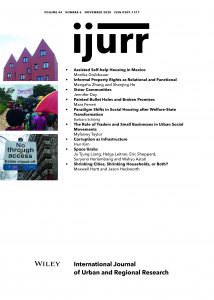Volume 44 Issue 6 November 2020
In This Issue...
Articles
As all eyes are trained on the global spectacle that is Trumpism, this issue of IJURR brings together articles, many of which are concerned with the making of markets. Such scholarship is vitally important at all times, but especially in moments of political crisis, when the fragility of liberal democracy is exposed. This fragility stands in contrast to, or even props up, the endurance of global markets. Understanding the making of markets has thus always been a key task of critical urban theory. In this issue, the authors are attentive to an exciting repertoire of markets, from self-help housing in Mexico (Grubbauer) to extralegal property systems in China (He and Zhang) to the transformation of social housing in Germany (Schönig). The articles also illuminate two conceptual frameworks that have been quite prominent in the work of IJURR: informality (Day) and dispossession (Ferreri). Both Day and Ferreri critique and expand theorizations of informality and dispossession through careful ethnographic engagement with embodied and emplaced communities. Capitalist transformations are of course always the terrain of struggle and this is the theme of Taylor’s article on workplace mobilizations in London. But I want to return to the moment at hand and consider what it means for how we understand capitalism itself. Kim’s article on ‘corruption as infrastructure’, situated in Saigon, reminds us of the speculative calculations of risk and reward through which ‘the city becomes a knowable object for investment’. Indeed, we can argue that such speculative calculations, or what is called corruption, are essential for the endurance of markets as well as the fragile reproduction of liberal democracy.
—Ananya Roy
Interventions
This issue’s Interventions Section also emphasizes the endurance of global markets and real estate speculation, with two empirically rich essays reflecting on market responses to regulatory shifts and demographic changes. The first piece, by Ju Tjung Liong, Helga Leitner, Eric Sheppard, Suryono Herlambang and Wahyu Astuti, describes an emergent form of ‘space grab’ that is facilitating the proliferation of high-rise construction across South and Southeast Asia. As the authors describe in the context of Jakarta, but with much broader implications, developers and real estate lobbies have worked to establish and privatize exemptions to building height restrictions through mechanisms such as floor area uplift (FAU) and tradable development rights (TDR), that have led to the ‘assetization’ of air. In this insightful and informative piece, the authors outline the mechanisms that have facilitated this new building boom and encourage urban scholars to further examine the implications of ‘vertical colonization’. The piece by Maxwell Hartt and Jason Hackworth, meanwhile, considers the implications of demographic changes and encourages urban scholars to think past the binary of urban growth/decline. Meticulously documenting the changes to household size that underlies population decline in some ‘shrinking’ cities, the authors’ find that reduced household size, including increases in single-person homes, is often more responsible for population loss than the economic and political failures associated with urban shrinkage. This timely and lucid investigation into the population dynamics of cities and suburbs, demonstrates that better, context-specific urban and regional policy can help reduce the inequities within and across regions.
—Liza Weinstein
Articles
Assisted Self‐Help Housing in Mexico: Advocacy, (Micro)Finance and the Making of Markets
Published online on Jul 7th, 2020 | DOI: 10.1111/1468-2427.12916 (p 947-966)
Informal Property Rights as Relational and Functional: Unravelling the Relational Contract in China’s Informal Housing Market
Published online on Aug 7th, 2020 | DOI: 10.1111/1468-2427.12927 (p 967-988)
Sister Communities: Rejecting Labels of Informality and Peripherality in Vanuatu
Published online on Oct 20th, 2020 | DOI: 10.1111/1468-2427.12965 (p 989-1005)
Painted Bullet Holes and Broken Promises: Understanding and Challenging Municipal Dispossession in London’s Public Housing ‘Decanting’
Published online on Sep 25th, 2020 | DOI: 10.1111/1468-2427.12952 (p 1007-1022)
Paradigm Shifts in Social Housing After Welfare‐State Transformation: Learning from the German Experience
Published online on Jul 7th, 2020 | DOI: 10.1111/1468-2427.12914 (p 1023-1040)
The Role of Traders and Small Businesses in Urban Social Movements: The Case of London’s Workspace Struggles
Published online on Oct 8th, 2020 | DOI: 10.1111/1468-2427.12953 (p 1041-1056)
Corruption as Infrastructure: Rendering the New Saigon Global
Published online on Oct 6th, 2020 | DOI: 10.1111/1468-2427.12951 (p 1057-1071)
Interventions
Space Grabs: Colonizing the Vertical City
Published online on Sep 4th, 2020 | DOI: 10.1111/1468-2427.12949 (p 1072-1082)
Shrinking Cities, Shrinking Households, or Both?
Published online on Nov 12th, 2018 | DOI: 10.1111/1468-2427.12713 (p 1083-10895)
Book Reviews
Jefferson, Brian 2020: Digitize and Punish: Racial Criminalization in the Digital Age. Minneapolis, MN: University of Minnesota Press
Published online on Nov 4th, 2020 | DOI: 10.1111/1468-2427.12968 (p 1096-1097)
Costa Vargas, João H. 2018: The Denial of Antiblackness: Multiracial Redemption and Black Suffering. Minneapolis, MN: University of Minnesota Press
Published online on Nov 4th, 2020 | DOI: 10.1111/1468-2427.12969 (p 1097-1099)
Watson, Sophie 2019: City Water Matters: Cultures, Practices and Entanglements of Urban Water. London: Palgrave Macmillan
Published online on Nov 4th, 2020 | DOI: 10.1111/1468-2427.12970 (p 1099-1100)
Mosselson, Aidan 2019: Vernacular Regeneration: Low‐income Housing, Private Policing, and Urban Transformation in Inner‐city Johannesburg. New York: Routledge
Published online on Nov 4th, 2020 | DOI: 10.1111/1468-2427.12971 (p 1100-1103)
Trudolyubov, Maxim 2018: The Tragedy of Property: Private Life, Ownership and the Russian State. Cambridge: Polity Press
Published online on Nov 4th, 2020 | DOI: 10.1111/1468-2427.12972 (p 1103-1104)
Balakrishnan, Sai 2019: Shareholder Cities: Land Transformations along Urban Corridors in India. Philadelphia, PA: University of Pennsylvania Press
Published online on Nov 4th, 2020 | DOI: 10.1111/1468-2427.12973 (p 1104-1106)
Issues in this volume
January 2020
March 2020
May 2020
July 2020
September 2020
November 2020

